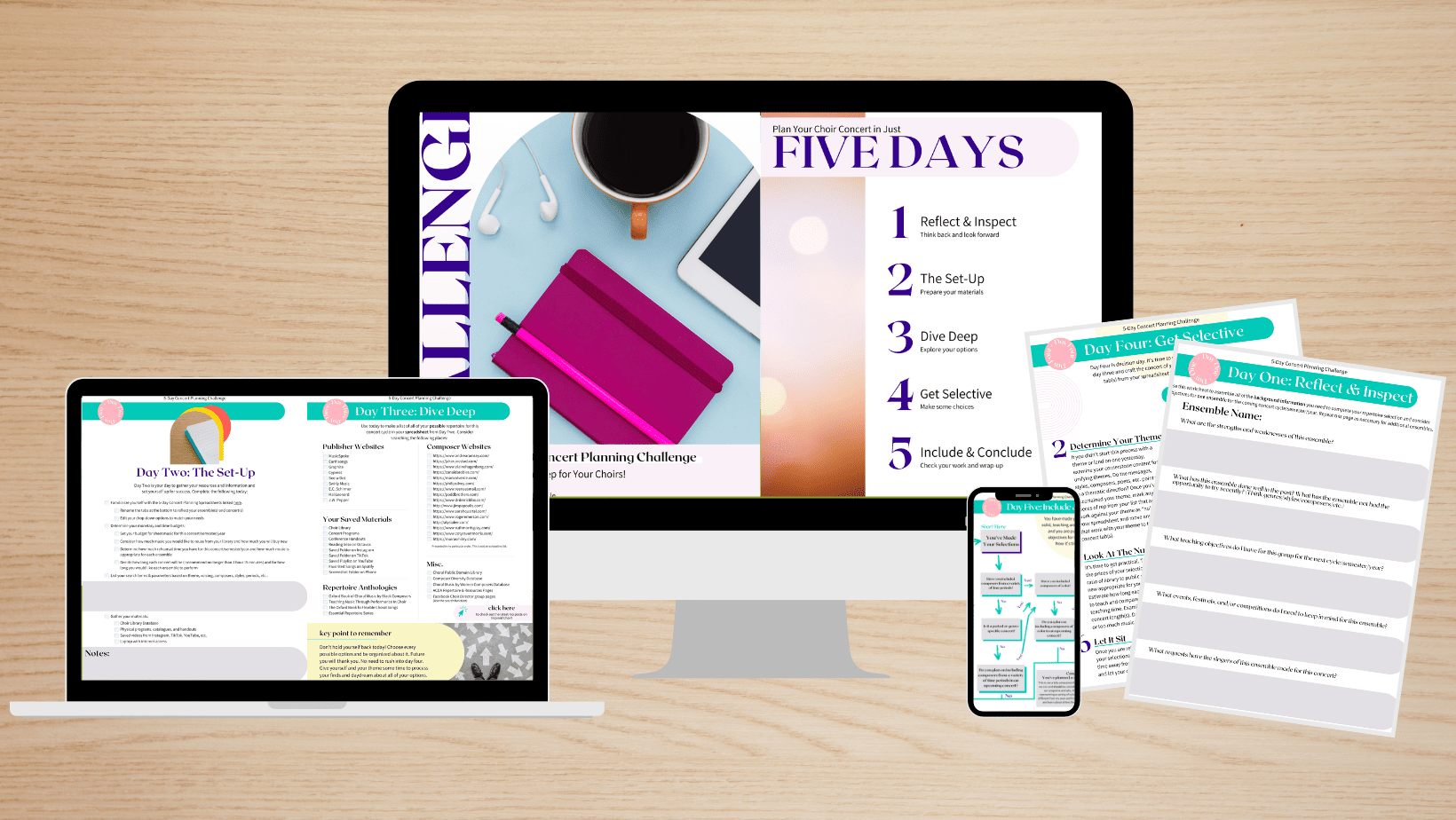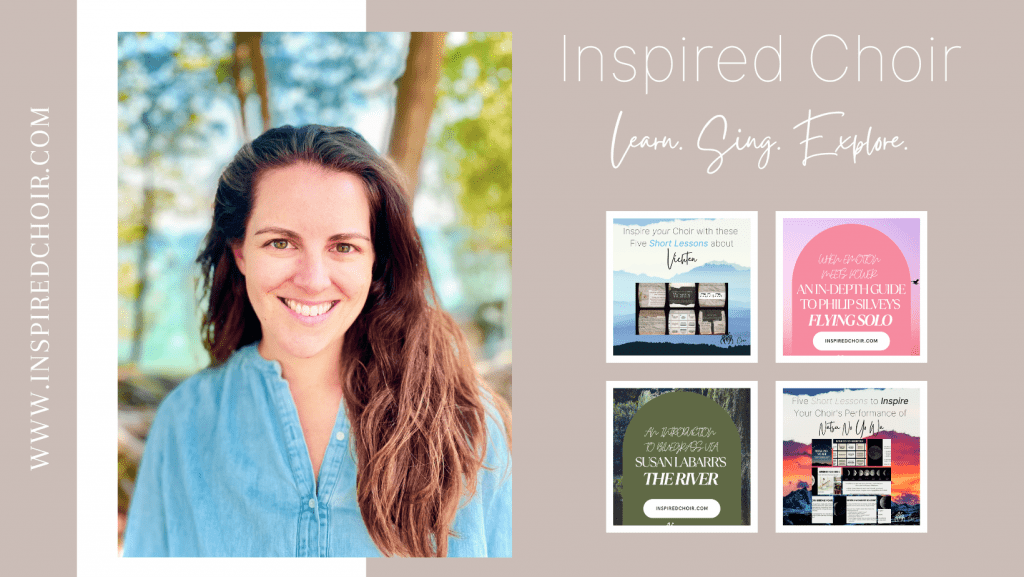“Elements” and “Ascend”: Middle School Festival Programs Rep Round-Up
This Friday, I have the opportunity to conduct my second junior high/middle school choral festival of the year. In the spring, I had the pleasure of working with the Alabama ACDA Young Voices Festival Girls Choir. This week, I am looking forward to working with the Arkansas Region One Junior High Tenor/Bass Choir. In this post, I share the excellent repertoire for each of these short programs, entitled Elements and Ascend. Check out our programs and notes below!
- Treble Choir Short Program: Elements
- Bass Choir Short Program: Ascend
- “Elements” and “Ascend” Teacher Resources

Treble Choir Short Program: Elements
The Alabama ACDA Young Voices Festival was a two-day event, so we were able to learn and perform five pieces in our time together. I was told by conference organizers to focus on fun and accessibility for the 4th-8th grade singers. With this in mind, I chose mostly 2-part music, with one round in 3-parts.
The theme of the program was Elements. During our two days together, the choir and I discussed the natural elements (fire, water, earth, and air), and their connection to each piece. We also talked about ways in which we as singers and as people can influence the natural world around us.
Nanuma

An arrangement of a traditional greeting song from Ghana, Nunuma is a sweet entrance piece for any program. The octavo does not include a translation or language designation for the text. I did some digging and combined interpretations from a variety of resources and in turn shared the following message with the singers: “As we travel through life, have we done enough good?” We discussed the good we can do within our natural environments.
Additionally, I shared maps and pictures of Ghana with the ensemble to establish an understanding of the country and the people who live there. As I discussed in my post about the South African piece Modimo, we often present only one story of the whole continent of Africa, and I endeavored to share multiple stories with these students.
Natsu No Yo Wa

With a sweet, pentatonic melody, accessible harmonies, and Japanese folk roots, Ruth Morris Gray’s Natsu No Yo Wa is an excellent choice for beginner choirs of all ages. Because the Young Voices singers learned the melodies, harmonies, and text so quickly, we were able to spend a nice amount of rehearsal focusing on musicianship and story-telling. With the knowledge of the history and context of the piece, these young singers painted a beautiful aural image of the moon setting behind the mountains of Kyōto. Learn more about the story and poetry and current Japanese music in this post.
When I Grow Up

Ask a kid what they want to be when they grow up, and they’ll likely have a list of professions ready to go for you. Not only did the Young Voices singers enjoy the variety of styles and textures throughout the piece, they loved talking about their visions of growing up, sharing their interpretations of the text, and learning about the composer, Connor Koppin, and lyricist, Coty Raven Morris. Due to the stellar message of the piece and skillful text-setting, the singers had much to talk about as they interpreted When I Grow Up. Read more about it here.
Turn the World Around

Harry Belafonte and Robert Freedman’s Turn the World Around as arranged by Mark Hayes connected perfectly to When I Grow Up through the discussion of the elements: fire, water, earth, and air (spirit in this piece). Not only does this piece present an engaging melody and beat, but also it encourages discussion of getting to know and appreciate one another within our natural world. This is a perfect piece to dig into social emotional learning – especially the concepts of social awareness and relationship building.
Walk Through Life

This piece by Pinkzebra is an excellent set closer with upbeat pop rhythms, soaring vocals, and uplifting lyrics. A favorite of many of the singers, Walk Through Life encourages singers and listeners to shine bright, think of every day as a new day, and keep moving forward because life just keeps getting better.
Bass Choir Short Program: Ascend

With only about four hours of rehearsal time together, the Arkansas Region One Junior High Tenor/Bass Choir will need to work quickly and efficiently to put together our program of four pieces. I was told by conference organizers to choose three- and four-part music for this group of Junior High singers. With this in mind, I chose a variety of voicings and difficulties for these singers.
The theme of this program is Ascend. During our time together, the singers and I will discuss the different ways we ascend every day – from ascending to our roles in life (Viva!) to lifting up our voices for social change (Testify and Lift Up Your Voice) to climbing mountains (Fly Away Home) . We will also examine the way ascending motion in music is used throughout TaReKiTa as well as each of the other pieces.
Viva!

Viva! provides a window into music of the Classical period, with Italian language, Austrian connections, and celebratory energy throughout. This piece appeals to the singer or audience member who enjoys a traditional piece, while also introducing foundations of choral music to those who typically prefer contemporary choral music. To learn more about Mozart, the historical context of the piece, and the technicalities of singing in Italian, visit this post on Viva!
Justice Choir Handbook Selections

Coedited by co-edited by Abbie Betinis, Ahmed Anzaldúa, and Tesfa Wondemagegnehu, the Justice Choir Handbook contains 34 songs promoting social and environmental justice through community singing. The tenor/bass honors choir will be performing “To Testify” and “Lift Up Your Voice” from the handbook. These two pieces will open up the door to discussion about speaking up for ourselves and others with joy and courage. The Handbook can be downloaded for free at this link.
Fly Away Home

With sweet melodies, charming text, and approachable harmonies, Fly Away Home by Pinkzebra is available and accessible for choirs of all voicing types. As singers consider the meaning of home and the feelings they associate with concept, choirs have the opportunity to share and connect – and perhaps find the freedom of home with each other. Check out this post about Fly Away Home to learn more about the composer and their work, the lyrics of the piece, and the use of pop tonalities in choir.
TaReKiTa

Los Angeles based Reena Esmail composes in a style that is a wonderful fusion of Western and Indian classical musics. As a first-generation Indian American, Esmail found her musical style by searching for “places between my cultural identities that felt resonant to me.” Click here to read more about the composer, examine the way she utilized Indian classical frameworks (including an ever-present ascending raga) throughout TāReKiTa, and explore musical contexts that can help any singer or listener of the piece understand and appreciate it that much more.
I’d Love to Hear from You!
What do you think of the programs? Or the themes? Which pieces might you add or subtract? What other pieces belong in a “Elements” or “Ascend” concert? What would you like to see next on Inspired Choir? Let me know your thoughts in the comment section below!
“Elements” and “Ascend” Teacher Resources
Planning Your Next Choir Concert?
Join the Five-Day Concert Planning Challenge with Inspired Choir!

Free Comprehension Worksheets
Choir Leaders! I have begun to include short comprehension worksheets with each Inspired Choir blog post. Each worksheet includes 5-6 knowledge-based questions about the post and concludes with a musical decisions/applications question. Use as a homework assignment, sub activity, listening challenge, or guide for conversation in class.
Lesson Plan Bundles
Are you a choir teacher who has programmed any of the pieces above? Let me share my teaching resources with you! Check out the Inspired Choir Shop for lesson plan bundles with five short and transferable lessons each, all with connections to National Standards and SEL Competencies.




















